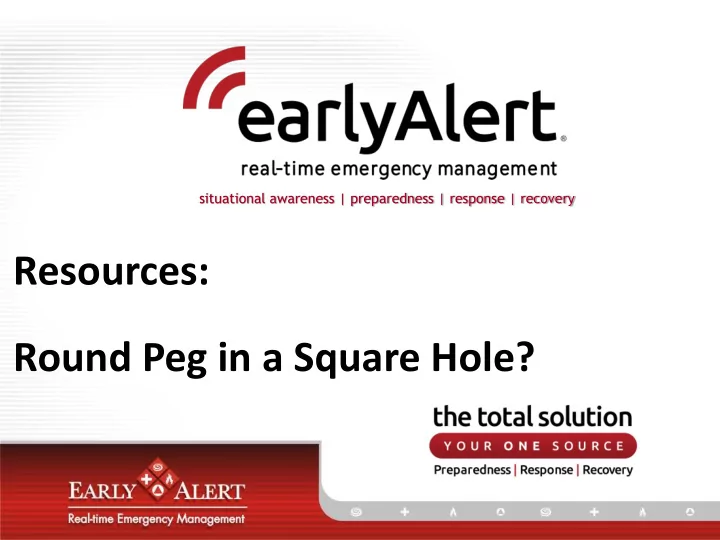

situational awareness | preparedness | response | recovery Resources: Round Peg in a Square Hole?
The purpose of this presentation is to analyze both the local jurisdiction’s and IMT’s perspectives regarding resource ordering, tracking, and demobilization and discuss best practices for effective resource management during a complex incident.
NIMS 2017 Update: Resources - Preparedness Activities • Before an incident jurisdictions and organizations develop resource plans. • This resource planning includes identifying resource requirements based on an assessment of threats and vulnerabilities and developing strategies to obtain the needed resources. • Resource management strategies include stockpiling resources, establishing mutual aid agreements to obtain resources from neighboring jurisdictions, determining approaches to reassigning resources from non-essential tasks, and developing contracts to rapidly acquire resources from vendors when needed. • A resource inventory is used to track resource availability and enables organizations to acquire resources promptly when needed for an incident.
Resources - Activities During an Incident • The resource management process is the six resource management tasks performed in an incident. • The resource management process includes methods to identify requirements, order and acquire, mobilize, track and report, demobilize and reimburse and restock resources in an incident.
Are you getting the right resources? What guidance should be given to the IMT by the local AHJ? Who decides more resources are needed? Who is responsible for tracking resources? Who is responsible for demobilization?
What actions do incident management professionals need to perform to effectively manage resources?
ICS 201 during the initial response lays foundation for successful resource ordering, check-in, and tracking Staging Area(s) established and staffed with qualified STAM early Recognition of complex incident with commensurate ICP, IMT, and EOC staffing When in doubt roll it out! ID of critical resources Effective, accurate, and consistent check-in Planning Section staffed early with qualified RESL
Initial IC or designee begins the 201: Map/sketch including perimeter/control points and staging area location(s) Consistent check-in procedures Initial objectives: ID resource needs Resources currently assigned, en route and requested with ETA If initial IC does not begin 201 IMT can assist
Staging Areas (or the lack of) can make you or break you on a complex incident: Map/sketch including perimeter/control points and staging area location(s) Consistent check-in procedures Initial objectives: ID resource needs Resources currently assigned, en route and requested with ETA If initial IC does not begin 201 IMT can assist
Sometimes it’s obvious and sometimes it isn’t: Do you need a resource you’ve never needed before? Do you need 10 times the amount of a resource you’ve needed before? Do you NOT know what you need? If the answer is “Yes” to any of these questions you have an incident that is increasing in complexity.
If you think you need a resource: Don’t delay ordering it You may need it In most cases you can turn it back Documentation
Critical resources are: The resources you MUST have On large-scale complex incidents shortages occur Identify in the preparedness phase Pre-existing agreements in place Consider Area Command
Effective check-in requires: Perimeter/checkpoint control and enforcement Consistent check-in procedures Fully staffed planning section with qualified personnel STAM’s and other check -in personnel must coordinate with planning section
We preach against it but on large-scale incidents: Self deployment is very likely to occur We need to prepare for it What if you really do need the resource? Consider a separate staging area for unconfirmed resources
Effective resource management requires: Fully staffed and qualified Planning Section Qualified LSC and SPUL (ORDM and RCDM if available) Qualified OSC and STAM Command emphasis on resource management
Watch out for: Resources in staging for prolonged periods of time Resources that don’t demobilize when replaced Resources that don’t demobilize when ordered to Getting charged for demobilized resources
Questions? Comments?
Recommend
More recommend